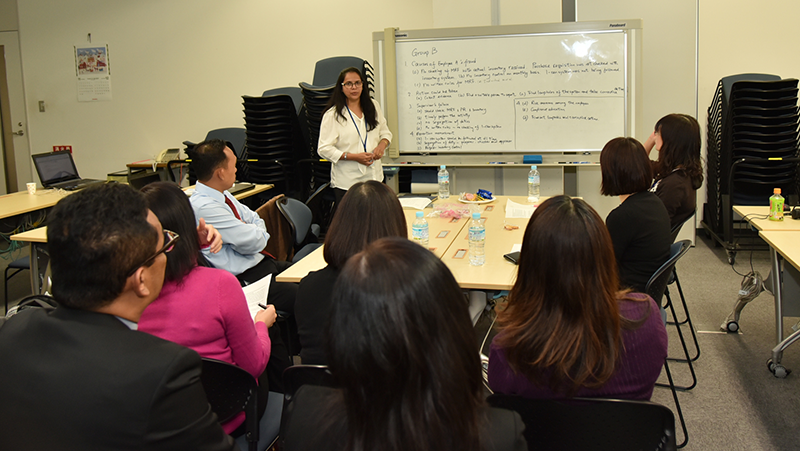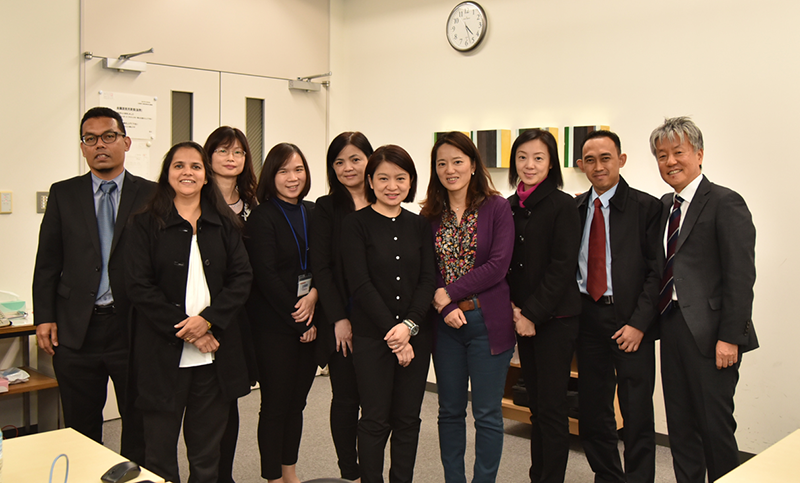
The headquarters of Polyplastics is serious about preventing the recurrence of inappropriate conduct in PAP and has once again begun efforts to strengthen compliance throughout the Polyplastics Group. During the compliance workshop seminar held at the Tokyo head office, case studies were prepared based on cause analysis investigations conducted by PAP that clarified the facts in regard to cases of dishonest action. The seminar was planned with the intention of giving each employee the information necessary to understand the causes of dishonest action and implement preventive measures. Nine persons were invited to attend the seminar held on December 15 at the head office in Tokyo: Mr. Shamsul Hussin and Mr. Hezrey Kasim from PAP, Ms. Tracy Zhang from PTM/PNL, Ms. Amanda Liu from PTW, Ms. Crystal Lam from PCL, Ms. Shirley Xu from PSL/PTSL, Ms. Pauline Khoo from PAPS, Ms. Smita Moghe from PMI, and Ms. Benjaporn Rangsatit (Jay) from PMT. They were requested to participate in the seminar so that they could return to their respective companies as leaders responsible for conducting ongoing compliance education. The training seminar for leaders held at the Tokyo head office was planned and carried out by Mr. Naoki Chiba, who is in charge of public relations and CSR in the General Administration Dept.
The seminar began with opening remarks by Mr. Yuki Yoneda, executive officer responsible for risk management and corporate compliance, who talked on the following three points.
1.Why compliance is important.
2.How to prevent wrongdoing and non-compliance.
3.Expectations for workshop participants.
Mr. Yoneda's comments on the three points are summarized below.

1.Non-compliance seriously damages the company. The past example of Enron Corporation and recent examples of the global-scale scandals at Volkswagen and Takata in Japan were cited.
2.Three points were stressed as vital to prevent wrongdoing: recognition of the mechanisms of wrongdoing, development and improvement of the compliance mindset of each employee, and improvement of work flows and job systems to reduce opportunities to engage in wrongdoing.
3.Seminar attendees were asked to take advantage of the opportunity provided by the workshop to consider what compliance means and involves, take the knowledge they acquired back to their respective companies, and utilize that knowledge to develop and improve the compliance mindset of the employees in their company.
Next, Mr. Chiba explained the context in which the compliance training was being undertaken and its purpose and goals. After confirming that this was understood by all of the participants, they were divided into two teams to work on developing case studies.
They worked individually and in a group each for 40 minutes, took a break, and then got back into their group to consider and discuss 4 questions in regard to the case studies and then report on the answers they arrived at. Following this, Mr. Chiba gave a wrap up of the case studies and confirmed the answers suggested by the participants. The "Fraud Triangle" theory was introduced and measures to reduce wrongdoing were studied.

Then Mr. Hideaki Nakano, head of the Internal Audit Dept., talked on "Risk Management: Registration of Discreditable Incidents to the Risk Management DB" and "The Current Status of the Risk Management DB." He also explained about the importance of risk management in major work processes including cash and cash equivalent management, the sales process, the purchasing process, the inventory management process, and the tangible fixed asset management process, and that prompt and sure reporting of wrongdoing in accordance with the “Group Discreditable Incident Handling Manual” is crucial.
To wrap up the workshop seminar everyone reviewed the 9 paragraphs of the Polyplastics Group Conduct Policy, the Non-Compliance Reporting System was explained, and the seminar leader made sure all participants knew how to connect to the Web site to report non-compliance. A question-and-answer session was held, the participants reconfirmed their understanding of the importance of compliance, and the 3-hour workshop was brought to a successful conclusion. Thanks to all of the participants for their hard work. We have great expectations for you as you endeavor to promote compliance in the workplace. Of course, you can count on the head office to give you ongoing support.

Mr. Naoki Chiba